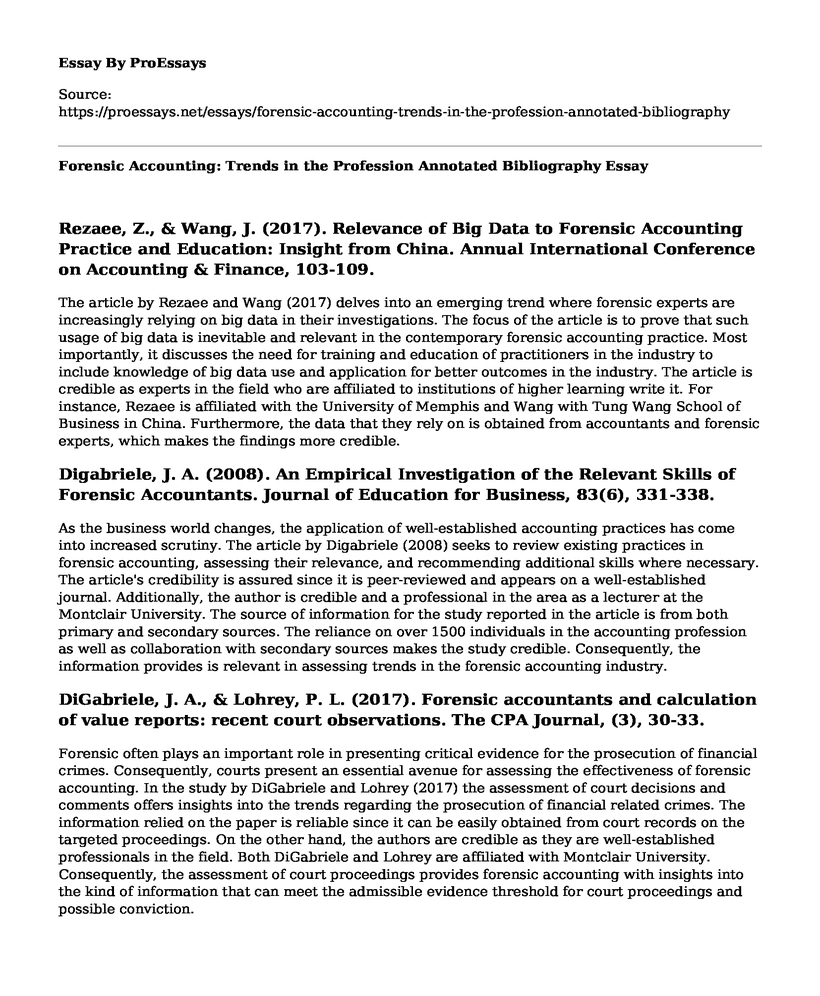Rezaee, Z., & Wang, J. (2017). Relevance of Big Data to Forensic Accounting Practice and Education: Insight from China. Annual International Conference on Accounting & Finance, 103-109.
The article by Rezaee and Wang (2017) delves into an emerging trend where forensic experts are increasingly relying on big data in their investigations. The focus of the article is to prove that such usage of big data is inevitable and relevant in the contemporary forensic accounting practice. Most importantly, it discusses the need for training and education of practitioners in the industry to include knowledge of big data use and application for better outcomes in the industry. The article is credible as experts in the field who are affiliated to institutions of higher learning write it. For instance, Rezaee is affiliated with the University of Memphis and Wang with Tung Wang School of Business in China. Furthermore, the data that they rely on is obtained from accountants and forensic experts, which makes the findings more credible.
Digabriele, J. A. (2008). An Empirical Investigation of the Relevant Skills of Forensic Accountants. Journal of Education for Business, 83(6), 331-338.
As the business world changes, the application of well-established accounting practices has come into increased scrutiny. The article by Digabriele (2008) seeks to review existing practices in forensic accounting, assessing their relevance, and recommending additional skills where necessary. The article's credibility is assured since it is peer-reviewed and appears on a well-established journal. Additionally, the author is credible and a professional in the area as a lecturer at the Montclair University. The source of information for the study reported in the article is from both primary and secondary sources. The reliance on over 1500 individuals in the accounting profession as well as collaboration with secondary sources makes the study credible. Consequently, the information provides is relevant in assessing trends in the forensic accounting industry.
DiGabriele, J. A., & Lohrey, P. L. (2017). Forensic accountants and calculation of value reports: recent court observations. The CPA Journal, (3), 30-33.
Forensic often plays an important role in presenting critical evidence for the prosecution of financial crimes. Consequently, courts present an essential avenue for assessing the effectiveness of forensic accounting. In the study by DiGabriele and Lohrey (2017) the assessment of court decisions and comments offers insights into the trends regarding the prosecution of financial related crimes. The information relied on the paper is reliable since it can be easily obtained from court records on the targeted proceedings. On the other hand, the authors are credible as they are well-established professionals in the field. Both DiGabriele and Lohrey are affiliated with Montclair University. Consequently, the assessment of court proceedings provides forensic accounting with insights into the kind of information that can meet the admissible evidence threshold for court proceedings and possible conviction.
Lohrey, P. L. (2017). Contemporary Research in Valuation and Forensic Accounting. Value Examiner, 32-36.
Research is an important part of ensuring there is knowledge progression in a specific field. This is true for forensic accounting where different scholars continue to put forward new ideas and concepts for the profession. The article by Lohrey (2017) offers an overview of other studies that have made significant findings or contributions in forensic accounting. As an assistant professor at Montclair University, the author is credible. Furthermore, the researches that the author reviews are credible and rely on information obtained from credible sources.
Rupert, T. J. (2015). Advances in Accounting Education : Teaching and Curriculum Innovations (Vol. First edition). United Kingdom: Emerald Group Publishing Limited.
The book by Rupert offers a comprehensive overview of the progress that has been made in teaching accounting, including forensics. The information offered by the publication is well researched, and not only provides the current status of forensics education but also offers recommendations for the teaching of the subject. The book is credible since the author is a professor of accounting. Furthermore, it is published by a highly credible publisher, which shows that its information can be relied on. Most importantly, its recommendations are current and applicable to modern forensic accounting.
References
Digabriele, J. A. (2008). An Empirical Investigation of the Relevant Skills of Forensic Accountants. Journal of Education for Business, 83(6), 331-338.
DiGabriele, J. A., & Lohrey, P. L. (2017). Forensic accountants and calculation of value reports: recent court observations. The CPA Journal, (3), 30-33.
Lohrey, P. L. (2017). Contemporary Research in Valuation and Forensic Accounting. Value Examiner, 32-36.
Rezaee, Z., & Wang, J. (2017). Relevance of Big Data to Forensic Accounting Practice and Education: Insight from China. Annual International Conference on Accounting & Finance, 103-109.
Rupert, T. J. (2015). Advances in Accounting Education : Teaching and Curriculum Innovations (Vol. First edition). United Kingdom: Emerald Group Publishing Limited.
Cite this page
Forensic Accounting: Trends in the Profession Annotated Bibliography. (2022, Oct 06). Retrieved from https://proessays.net/essays/forensic-accounting-trends-in-the-profession-annotated-bibliography
If you are the original author of this essay and no longer wish to have it published on the ProEssays website, please click below to request its removal:
- How to Install Windows XP Paper Example
- Financial Reporting Unit Paper Example
- Maximizing Employee Performance: The Relationship Between Workplace Spirituality & Organizational Effectiveness
- Paper Example on Capital Punishment Ethics: Does the US Stance Conflict?
- Prisoners Receiving Free College Education: Pros & Cons - Essay Sample
- Free Essay Example on Gun Violence in America: An Alarming Reality
- Mental Illness & Juvenile Offenders: A Worrying Issue - Annotated Bibliography Sample







